If you’ve ever felt that uncomfortable, full feeling in your abdomen after a meal, you aren’t alone.
Bloating is one of the most common digestive complaints with somewhere around 30% of the population reporting that they deal with it frequently. And though it can occasionally be an indicator of a bigger problem, the culprit behind most cases of belly bloat is the food you eat.
Fortunately, we now have a lot of insight into the best and worst foods for bloat. Simply making a few diet tweaks can do your digestion a world of good!
Common Causes of Belly Bloat
Bloating is most commonly caused by a buildup of gas in your system, although sometimes excess fluid adds to the discomfort as well.
For many people, this gas comes from food that is difficult to digest or that your body is sensitive to. (If you want to get even more technical, gas is created when bacteria in your digestive tract ferment certain substances like fiber, starches, and sugars.)
Other sources of gas that may contribute to bloating include swallowed air, overeating, and constipation. Also, low levels of stomach acid or digestive enzymes and bacterial imbalances make it more difficult for your body to digest food— leading to yet a greater chance you’ll experience gas and belly bloat.
The bottom line is that improving your digestion overall is key to beating bloat in the long run. However, there still may be certain foods that make you feel bloated, and avoiding them is your best bet.
When is Bloating a Problem?
In some cases, bloating can be a sign of a bigger underlying problem. It’s a common symptom of irritable bowel syndrome (IBS), celiac disease, and other digestive issues. In much rarer cases, it could be a warning sign of certain types of cancer.
If your bloating is constant (i.e., never “deflates”) or you experience other symptoms with it, you may want to consider getting checked for a more serious condition.
Otherwise, use the following lists to identify which foods make you feel worse— something that will be different for everyone— and which ones bring relief.
Worst Foods for Bloat
High Sodium / Salty Foods
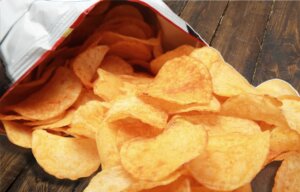
Foods that are salty or high in added sodium promote water retention, which can make you feel uncomfortably bloated. And the bad news is that about 90% of Americans overconsume sodium, making it likely that you do, too.
While you do want to pay attention to how much salt you shake on your food, the majority of your intake likely comes from elsewhere. In fact, estimates put about 70% of total sodium consumption for the average person down to processed or restaurant foods.
The best approach is to avoid processed foods as much as possible. At the very least, pay attention to the amount of sodium listed on the package— and be aware it shows up in strange places, like baked goods and ice cream!
Dairy
Not everyone is sensitive to dairy, but it’s still a very common trigger for bloating. Some people have a strict intolerance to lactose (the natural sugar in milk), while others simply have trouble digesting it fully.
Either way, if you notice symptoms like gas, belly bloat, and cramping after eating dairy, it’s likely a problem for you.
One option, of course, is to give up dairy products entirely in favor of plant-based options. Or you can try a supplement containing the enzyme lactase, which helps your body break down lactose.
Beans
You probably aren’t surprised to see beans listed here as one of the top foods causing bloat. They are somewhat infamous for their gas- and bloat-causing effects, mainly due to their high fiber content and the presence of hard-to-digest carbs known as alpha-galactosides.
Because beans and legumes are very healthy foods overall, you might want to try a few tricks for improving their digestibility before giving up on them entirely. For example, soaking and/or sprouting beans before cooking them makes them easier to digest.
High Fat Foods

Foods high in fat, especially saturated fat, contribute to bloating because they slow down your digestion. Essentially, fats take longer to digest than other substances, so they “hang out” for a lot longer.
Not only can this contribute to constipation— one major cause of frequent belly bloat— it also seems to be particularly problematic for those prone to indigestion, according to research.
To help your body out, limit foods like cheese and processed or red meats, which are high in saturated fat. Consider eating more plant-based fats (like avocados or nuts) because they are typically rich in unsaturated fats.
Artificially Sweetened Foods & Beverages
Artificial sweeteners are common in sugar-free and low-calorie foods (despite their questionable health effects).
However, they can be problematic for your digestion because they don’t always digest fully in the small intestine. This leads to excess gas and bloating in the large intestine from bacteria feeding on them.
While you may not be sensitive to the same sweetener as someone else, sugar alcohols like sorbitol and mannitol are common culprits for belly bloat. They are even listed as FODMAPs, a designation given to carbs that tend to be fermented by gut bacteria and likely to cause digestive issues.
Broccoli & Other Cruciferous Veggies
Cruciferous vegetables have a whole host of health benefits, but they are also notoriously hard to digest. This can make them some of the worst foods for bloat (and gas) for many people.
Part of the “problem” with cruciferous vegetables, like broccoli, is their high fiber content. They also contain a complex sugar known as raffinose that the human digestive tract can’t break down.
To help yourself digest these veggies better, make sure you eat them cooked rather than raw. Steaming seems to be the ideal method for broccoli and possibly others in the cruciferous group. Research has found that steaming helps break down the fiber and activates the health-promoting compounds in broccoli.
Carbonated Beverages
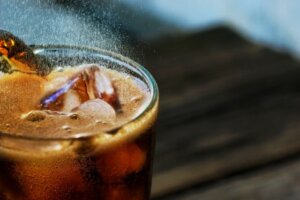
Carbonated drinks can cause bloating in some people simply because they contain high amounts of carbon dioxide— a gas. Depending on how much and how often you consume these types of drinks, this gas can build up and make you feel uncomfortable.
Of course, many carbonated beverages include lots of sugar and other additives that aren’t good for you, either. Consider limiting your intake to 8 ounces or less per day. Swap them out for healthier alternatives, especially pure water (and these 8 best drinks for your youngest-looking skin).
Beer
Beer can promote bloating in several ways.
To start with, it’s a carbonated beverage, which means it adds gas (carbon dioxide) to your digestive tract. In addition, beer often contains grains with gluten, a difficult-to-digest substance for certain people.
Even for those not sensitive to gluten, beer is a source of fermentable carbs that frequently contribute to belly bloat. If that weren’t enough, alcohol can also disrupt digestion and even interfere with good gut bacteria.
Apples
There’s no question that apples are healthy, but unfortunately, they can also be one of the foods causing bloat problems. They are high in fiber and high in fructose, which is a type of sugar that can cause bloating in certain people.
You can test taking apples out of your diet and adding them back in to see if they are contributing to digestive issues. If so, make sure you substitute other healthy, whole fruits like berries or citrus so you aren’t missing out on the nutrients or fiber!
Other High Fiber Foods
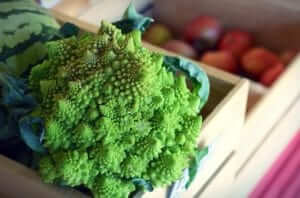
Fiber, in general, can contribute to bloating, especially if you up your intake suddenly. This is because your body can’t fully digest all types of fiber and because it’s often fermented by bacteria, releasing gas.
Now, this does not mean that you should stop eating fiber-rich foods. Fiber has numerous outstanding health benefits and is very under-consumed in the standard western diet.
What you can do is follow these tips for avoiding bloat associated with fiber:
- Up your intake slowly to allow your body (and gut bacteria) to get used to it.
- Drink lots of water to keep the fiber moving through.
- Try different types of fiber-rich foods to see which ones you digest the best.
Best Foods for Bloat
Cucumbers
Cucumbers are about 96% water. This high water content is good for helping waste move out of your body smoothly, which can lessen digestive issues that contribute to bloat. Cucumbers also contain an antioxidant known as quercetin that may ease inflammation and swelling.
Enjoy cucumbers raw in salads, sneak them into smoothies, or try a refreshing glass of cucumber water.
Bananas
Bananas contain a key nutrient that fights bloating related to water retention: potassium.
Potassium is an essential mineral and electrolyte that helps to regulate sodium levels in your body. This means it— and bananas— can be especially helpful when you’ve consumed too much salt.
As a bonus, bananas contain fiber that helps with regularity but are still easy to digest.
Some other high potassium foods you might want to try include:
- Sweet potatoes
- Avocados
- Spinach
- Lentils (soak before cooking to improve digestibility)
- Winter squash
- Coconut water
Asparagus
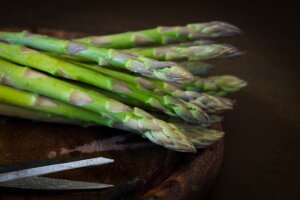
Asparagus may be a bit surprising as one of the best foods for bloat, but it has several good qualities. One of its top properties is its ability to act as a mild diuretic to help flush out excess salt and water. This, in turn, can ease bloating associated with water retention or too much salt.
In addition to this, asparagus is a good source of prebiotic fiber, which can improve your digestion over time. Asparagus also has a fairly high water content (up to 92%) to help keep things moving and lessen your chance of bloat from fiber.
Rice
Rice makes it onto this list because it’s the only starch that doesn’t cause gas. Others— like wheat, potatoes, and corn— do produce gas when they get broken down in your large intestine, which means they may sometimes contribute to bloating.
Now, to get extra fiber and nutrients, you may want to choose whole grain types of rice versus white rice. This includes brown rice as well as others like red rice, Purple Thai rice, black rice, and wild rice.
On the other hand, some rices can contain concerning levels of arsenic if they grow in soil and water that contains high amounts of inorganic arsenic (rice is very good at absorbing what is in the soil). And the rices that tend to have lower levels of arsenic are certain white rices , such as white basmati rice grown in California. The smartest approach with rice is to consume it in moderation — and you can search online for “low arsenic rice” and variations on that term.
Yogurt & Other Probiotic Foods
Probiotic-rich foods are great for bloating because they help to balance your gut microbiome. This will help your body to better digest “difficult” substances, including fiber and sugars that normally contribute to gas.
Yogurt is one of the most popular probiotic foods and is generally great for gut health. However, you’ll want to keep an eye out for sugar and other additives in your yogurt that might make it less healthy. If you want to avoid dairy, look for plant-based yogurts or try options like sauerkraut, kimchi, and kombucha.
Also, keep in mind that suddenly adding a lot of probiotics to your system may actually upset your digestion. Try to introduce them gradually and give them several weeks to go to work.
Papaya & Pineapple
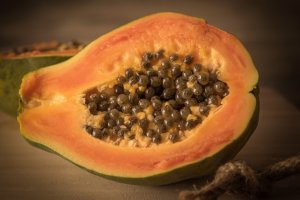
Pineapple and papaya have something in common: They both contain digestive enzymes.
Papaya contains an enzyme known as papain, while pineapple contains one called bromelain. Both help with the breakdown of proteins and can make digestion as a whole go a lot more smoothly. (Papain, especially, has been shown to ease bloating and constipation.)
Both fruits also have a high water content, which makes them even better foods for bloat.
Fennel Seeds
Fennel seeds have been used to aid digestion for thousands of years. They contain potent plant compounds and oils that can help reduce inflammation in the digestive tract and even decrease bacteria that cause gas.
The most traditional way to consume fennel seeds is to simply chew on them after a meal. You can also steep them in hot water to make a gut-soothing tea.
Green Tea (And Herbal Teas)
Green tea is great to sip on if you’re experiencing bloating. It’s rich in a type of antioxidant known as catechins that appear to support digestion as a whole and may relieve gas. (Studies have even shown that catechins may fight cancers of the digestive tract.)
Apart from green tea, several herbal teas also fight gas and bloating:
- Ginger— Contains a digestive enzyme and has carminative (gas-relieving) effects.
- Mint— Relaxes GI muscles and helps reduce gas.
- Chamomile— Eases digestive spasms and dispels gas.
- Cinnamon— Stimulates digestion and helps with “digestive discomfort”.
Just be sure to drink your tea warm for the best effects.
Fight the Bloat with Top-Quality, Pure Green Tea
As you can see, knowing which foods are causing bloat and which ones help ease it can make a world of difference.
If you are interested in helping your digestion simply by drinking a cup of tea, look into this superior quality Green Tea Sampler from Pique. This bundle contains not just green tea, which combats bloating on its own, but also a box of Mint Sencha for double the effects.
All teas from Pique are USDA Certified Organic and Triple Toxin-Screened to ensure they are free of heavy metals, pesticides, and toxic mold. Plus, the green teas included support healthy-looking skin, a better mood, and balanced energy— all while aiding digestion.
Find out more about the Green Tea Sampler from Pique here. And be sure you evaluate what you eat so you can eliminate any bloat-causing culprits!

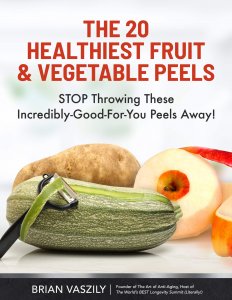

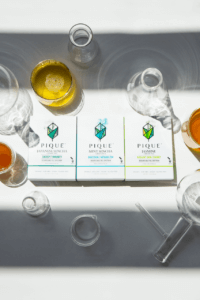
Thanks for this great post!! Lots of great ideas to try in order to reduce bloating.
Thank you so much for this information! Very informative and helpful!😊
Thank you. Very helpful.
Great article! I have often thought the almond butter might be the culprit but it could end up being the apple 8n that combo…
Good tips, it is always very helpful to receive information like this. Thanks to your team to put it together
Bryan you are just amazing. This article is a great tool for those who suffer from belly bloating. Always learning how to live a healthier and longer life with everything you share with us. Thanks a lot from Barcelona. Spain.
Excellent article! Very informative
Great article! Thanks to you and your team for once again summarizing useful information for your readers.
Very helpful article.
Thank you for these ARTICLES ON STOMach bloating. . Many can benefit from them.
Thank you for thus article. I believe that the foods that affect me most are bread and dairy. I am currently following a no flour, no sugar way of eating and have switched to mainly plant based milks.
Thank you for the great information. Now I know what to watch out for.
very insightful
Thank you for this article which provides food for thought and help with an ongoing problem in my family.
Hi Brian-Thank you for this and all the info you send out to help people. I want to share something with you. We invited one of my DPT husband’s patients to spend 4 days with us transitioning to a vegan diet, enjoying a rural setting, gardening, walking in the woods, dancing, meditating. no TV, singing and chanting, dogs, laughing. We started with an organic whole foods Rasta Ital meal of rice, garbanzos, collards, squash, seitan. We included a whole wheat bagel with oat butter to provide something she was used to eating sort of. She only ate eggs, dairy by way of animal products and fish. She has a long list of medical problems-with bloat, constipation, and gas so severe she says it is worse than labor pains and caused her to be totally disabled and crying in pain every day. She had to give up her job as director of a very successful program for patients at a mental hospital. After this one meal she had a normal BM and this continued for the 4 days.; 3 BM a day. No pain, sleeping peacefully, happy. We are in shock! So is she. A powerful awakening of how food is medicine. Not one of her many doctors ever talked about diet to her. WE are researching vegan food based doctors in her area for her and inviting her for another 4 day stay to reinforce her recovery. We are so very grateful that we are able to help her. I purchased the empowerment package and am sending it all to her. AND Brian, your Dad Jokes are getting funnier. Love, Hugs, and Blessings to You, Tai, Michael, Melli, & Jacu
Very good information. Thank you
thank you very much for the information and for the smiles from the dad jokes ,o)
Nice article; I was surprised about asparagus! Thanks so much; and btw, your dad jokes have been improving. Keep the good stuff coming!
Great information that I will be passing on. Thank you.